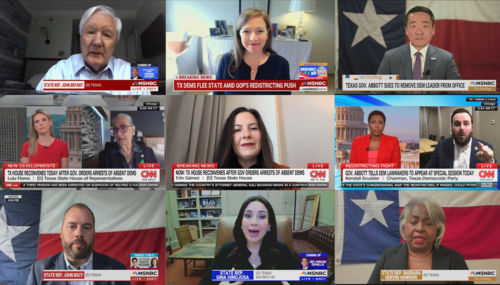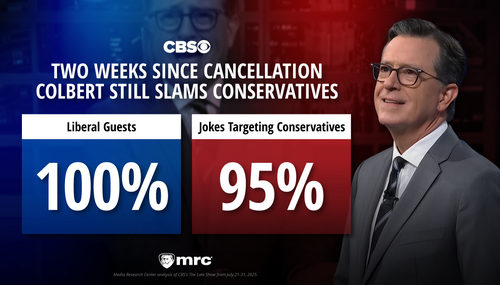Former CNN anchor Soledad O’Brien appeared on Sunday’s Reliable Sources to add her name to the list of liberals who argue that calling the rioters in Baltimore “thugs” is just “a proxy, is a word we use instead of the N-word.”
O’Brien asserted she “can't think of a situation where there's ever been a headline or someone has called a white young person who is in the middle of a violent protest demonstration, whatever, a thug. We use it all the time when we're talking about people in the inner city.”
For his part, guest host Frank Sesno noted that when he “looked the word up in a bunch of different dictionaries. In no place did I find a racial connection...and the African-American mayor of the city and the African-American president of the United States used the word.”
O’Brien responded by scolding those, including President Obama, of having a specific “agenda” when they chose to use the word “thug”:
Well, doesn't necessarily mean that they don't have a specific agenda in how they're using it. When you talk about journalists, though, I think journalists shouldn't have an agenda...And I think when you examine when the word is used, it's used to describe the actions of people of color, specifically people who are in the inner city.
I think for journalists to have a debate back and forth about thug and thuggery is naive and sort of misplaced, because it's not really the question. Journalists should strive to use words that describe accurately what's happening.
Sesno attempted to push O’Brien to accurately describe the violent Baltimore rioters but the former CNN anchor was very vague in her response:
You should use words very specifically. So, I think you say, these are protesters who are now throwing cement blocks at blah, blah, blah. These are people who are now doing this. Look at this picture. That group right there is doing this.
 O’Brien insisted that she did not condone violence but suggested that even the word ”riot” had a racial connotation:
O’Brien insisted that she did not condone violence but suggested that even the word ”riot” had a racial connotation:
I think when you look specifically about how the word riot is used, the word thug is used, it's always used around people of color, specifically in an inner city context. And, again, I can't tell you how the black mayor does it or the president of the United States chooses to use the word.
I can only comment on how I think journalists should think about a word that actually doesn't have a lot of nuance and isn't specific, but somehow seems to be used a lot when you're talking about African-Americans. So me personally, I wouldn't call someone a thug. I think it's not a descriptive term. The journalist's job, and I think what's been sorely lacking in this story, frankly, is context, right, description and context.
See relevant transcript below.
CNN’s Reliable Sources
April 3, 2015
FRANK SESNO: Joining me now is Soledad O'Brien, CEO of Starfish Media Group, a former CNN anchor who hosted the documentary “Black in America.” Soledad, thanks for being here.
SOLEDAD O'BRIEN: It's my pleasure.
SESNO: Why has thug become such a loaded word?
O'BRIEN: Listen, I think what the Baltimore city councilman, Carl Stokes, was trying to tell Erin Burnett is that thug is a proxy, it is a word we use instead of the N-word. And I think that's really true. I can't think of a situation where there's ever been a headline or someone has called a white young person who is in the middle of a violent protest demonstration, whatever, a thug. We use it all the time when we're talking about people in the inner city.
And so, I mean, listen, here, I randomly grabbed a bunch of headlines. "San Francisco Giants World Series Marred By Violence." The word thug doesn't come up at all, by the way, but they're talking about baseball fans marred by shootings and fires and arrests. Ohio State football revelers, mostly white, by the way -- this was back in January -- screaming in delight set nearly 90 fires, tear down a goalpost, blah, blah, blah, blah. We never describe them as thugs in that headline.
SESNO: But, Soledad, I looked the word up in a bunch of different dictionaries. In no place did I find a racial connection.
O'BRIEN: No, no, and, obviously, right?
(CROSSTALK)
SESNO: And -- and the African-American mayor of the city and the African-American president of the United States used the word.
O'BRIEN: Doesn't necessarily mean...
SESNO: So, if it's the equivalent of the N-word, how does that work?
O'BRIEN: Right. Well, doesn't necessarily mean that they don't have a specific agenda in how they're using it. When you talk about journalists, though, I think journalists shouldn't have an agenda. Richard Sherman, who played for the Seattle Seahawks, plays for the Seattle Seahawks, he really said, like, listen, it's the new N-word. And I think that's true.
And I think when you examine when the word is used, it's used to describe the actions of people of color, specifically people who are in the inner city. I think for journalists to have a debate back and forth about thug and thuggery is naive and sort of misplaced, because it's not really the question. Journalists should strive to use words that describe accurately what's happening. So, for example...
SESNO: So, what are the -- so, what are the words journalists should be using to describe the people who are out on the streets doing this kind of thing? It is lawless activity that they were seeing, right? Or are you -- we're not -- we're not trying to do -- to -- to excuse it in the process, are we?
O'BRIEN: Oh, gosh, not at all. I literally think you should use words very specifically. So, I think you say, these are protesters who are now throwing cement blocks at blah, blah, blah. These are people who are now doing this. Look at this picture. That group right there is doing this. Thug doesn't describe...
(CROSSTALK)
SESNO: But let me challenge you on that though, Soledad...
O'BRIEN: Sure.
SESNO: ... because wouldn't the protesters, people who have been going out of their way on the streets of Baltimore in peaceful protest...
O'BRIEN: Right. Those would be peaceful protesters.
SESNO: ... object to being -- to you using the words that there are protesters who are throwing the rocks and bottles?
O'BRIEN: I think there's violent protesters. I think there's peaceful protesters. I think there's drunk protesters. I think there's angry protesters. I think when you look specifically about how the word riot is used, the word thug is used, it's always used around people of color, specifically in an inner city context. And, again, I can't tell you how the black mayor does it or the president of the United States chooses to use the word. I can only comment on how I think journalists should think about a word that actually doesn't have a lot of nuance and isn't specific, but somehow seems to be used a lot when you're talking about African-Americans. So me personally, I wouldn't call someone a thug. I think it's not a descriptive term. The journalist's job, and I think what's been sorely lacking in this story, frankly, is context, right, description and context.
(CROSSTALK)
SESNO: And the words -- words deliver meaning. They deliver context. They also can trigger emotions...
O'BRIEN: Absolutely.SESNO: ... in different kinds of people, so it's really very important that they are close adhered. But we also don't want to run away from the English language. So, this isn't easy. And that's why the debates take place in newsrooms like this.




